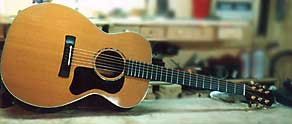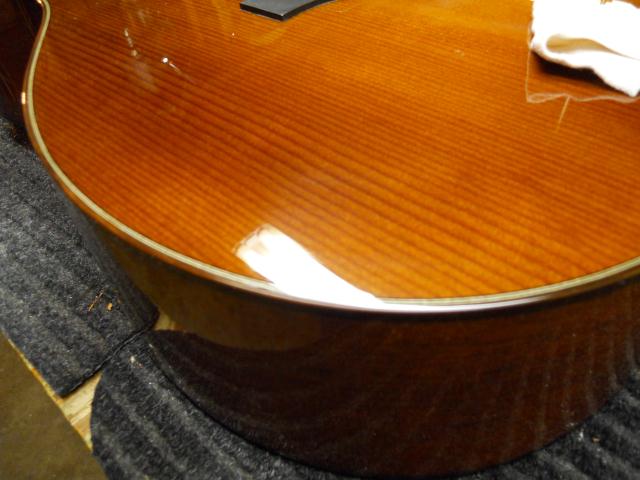|
| Repair Articles |
|---|
| Ask The Repairman |
| Repair Blue Book |
| Hardware Parts Accessories |
| Electronics |
| Guitar Wood and Kits |
| Tools |
| Friends |
|
|
|
|
|
CLEANING A DIRTY GUITARBy Steve CarmodyThis guitar is in excellent cosmetic condition except for the edge of the top on the lower bass side where the owner's arm rests while he plays. The top has a deep gloss finish but over time a combination of sweat and grime and dust has built up and you can't just wipe it off anymore. When it gets this bad regular guitar polishes won't help either. Some polishes do nothing at all, and the polishes with enough oil or wax will shine it for a little while, but they never really take the dirt off.
I have found that the best way to take built up grime off without hurting the finish is to use a small amount of super fine polishing compound and a cotton cloth. Polishing compound differs from regular liquid guitar polish in that it has abrasives in it. You generally will not find these types of polishing materials in a guitar store. Most polishes of this kind are used in the automotive industry, so that is where you can readily obtain them. But, of course guitar repair suppliers also have similar products.
There are available a variety of coarseness grades depending on what you are polishing. In both the repair and production of guitars polishing might begin with a coarse grade of polish and finer grades used until the final desired patina is reached.
Polishing compound formulated for use on plastics has super fine abrasives and is perfect for cleaning light surface dirt off of a guitar without marring the underlying finish, plus it will add a high gloss once all dirt has been removed. I find it to be the perfect thing to use on relatively pristine finishes that have small areas of surface grime. Do not use anything more coarse than this when you are cleaning dirt and oils off of a small area of an otherwise clean finish. In fact, always start with the least aggressive cleaning method before trying anything more intense. The only reason to try a polishing compound is because you have tried the liquid type. In this case I am using Mothers brand plastic polish, but both Meguiars and Novus also manufacture plastic polishes which are perfectly acceptable for cleaning gloss guitar finishes. Put a small amount of polish on a clean cloth or paper towel and start at one edge of the area you are trying to clean. Turn the cloth frequently to expose a clean surface of the cloth as the dirt transfers to it. Sometimes for a small area it is better to use a number of paper towels, discarding each as it builds up with dirty residue. If you keep rubbing the dirty face of the cloth into the area you are trying to clean you will spread the dirt around, as opposed to lifting it off the surface of the guitar. Working slowly, over time you will reach the surface of the finish and the last passes will actually be polishing the finish, not removing dirt. This method of cleaning is ideal for gloss finishes, because the deep gloss of the rest of the guitar can be restored to the area that is being cleaned. But be aware that satin and flat finishes , which are actually of a different composition than gloss finish materials, and are also not polished during the manufacturing process, will get shinier than the surrounding area if you polish them with compound; though they will never achieve the deep gloss of an actual gloss finish. In a shop setting the final step would be to buff the area out with a polishing wheel. But with a little elbow grease, more clean cloths or paper towels, and some liquid guitar polish, a nice shine can be restored to the previously dirty area. Steve Carmody is an independant guitar repairman and luthier with a shop in Silver Spring, Md. He has been doing guitar repair and restoration full-time since 1990. He reserves all rights to the contents of this article. Republishing of this material without attribution is not nice. Questions about this article or anything else related to guitar repair? Send e-mail to - GuitarRepairShop@aol.com |

